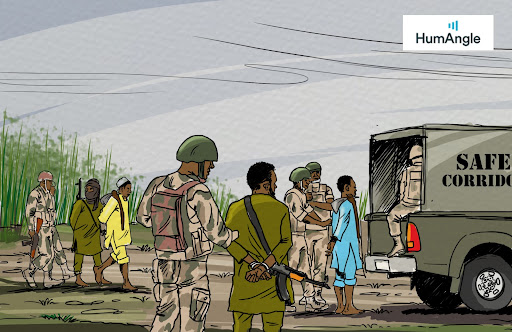Nigeria’s Vice President Reassures Boko Haram Deserters Of Improved Welfare
Following HumAngle’s report on poor management of Boko Haram defectors, the country’s Vice President has announced a series of packages to address the resource shortfall and improve the management of ex Boko Haram fighters.

The Nigerian Vice President, Yemi Osinbajo, on Thursday, Feb. 24, 2022, revealed initiatives of the government to improve the condition of Boko Haram defectors during a visit to a holding facility in Maiduguri, the capital of the northeastern State of Borno.
Osinbajo visited the Maiduguri Hajj Camp where some of the over 30,000 persons associated with Boko Haram, including former fighters, are being managed by authorities.
Due to the sensitivity of the visit to the facility, officials did not list it in the published itinerary of the Vice President; however, the holding facility was his first port of call.
Osinbajo informed the defectors of a presidential committee set up to handle the issues surrounding their management and reintegration into the society.
“I am the chairman of the committee, and your governor is the vice-chairman,” he said.
“So together, we will be working with you and with the state government as well as donor agencies and friends to ensure that we are providing you with not just income, but a place where you can settle down with your families and do your work and your businesses. But you must work patiently with us.”
Since the overrunning of Boko Haram Sambisa enclave by Islamic State West Africa Province (ISWAP) and the death of the group’s leader Abubakar Shekau, the Nigerian government has received waves of defectors surrendering to security forces.
The exodus and surrender of civilians, as well as fighters unwilling to join ISWAP ranks or the resistance against the group, has overwhelmed the capacity of the State authority to manage the defection program effectively.
HumAngle had previously reported that the threat of relapse and resource shortfall was casting a shadow on the disengagement process for tens of thousands of defectors and civilians who turned themselves over to authorities.
Already, dozens of deserters have relapsed and returned to the insurgent’s sanctuary after seeking safe passage and guarantee from counterparts who did not defect.
“Not all of the people who returned had it smooth,” one defector, however, disclosed to HumAngle. “One of my relatives was killed after he went back to the bush because they suspected he still had plans to desert. They noticed that he was selling some of the livestock he’d left behind.”
Although defectors are encouraged by the welcoming treatment from officials, insufficient care at the facility in Bama, southern Borno, was causing resentments and putting newcomers at risk, according to a number of the defectors.
HumAngle gathered that while the welfare conditions of defectors kept in Maiduguri have improved since they protested last November, those transferred to camps in Bama still face problems with feeding.
Support Our Journalism
There are millions of ordinary people affected by conflict in Africa whose stories are missing in the mainstream media. HumAngle is determined to tell those challenging and under-reported stories, hoping that the people impacted by these conflicts will find the safety and security they deserve.
To ensure that we continue to provide public service coverage, we have a small favour to ask you. We want you to be part of our journalistic endeavour by contributing a token to us.
Your donation will further promote a robust, free, and independent media.
Donate HereStay Closer To The Stories That Matter




